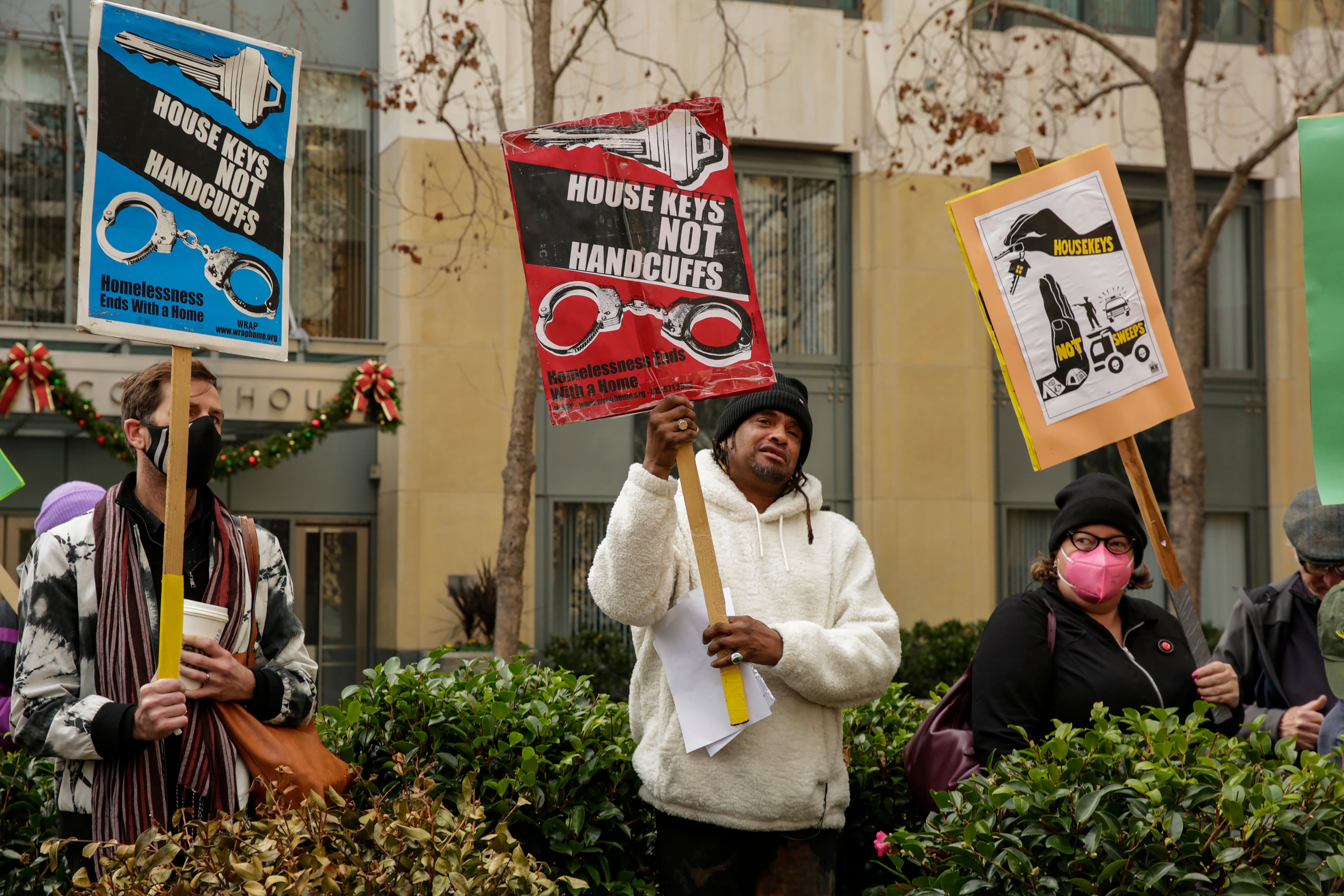Federal judge says San Francisco can't clear homeless camps
A federal judge has temporarily banned San Francisco from clearing homeless encampments, saying the city is violating its own policies

Your support helps us to tell the story
From reproductive rights to climate change to Big Tech, The Independent is on the ground when the story is developing. Whether it's investigating the financials of Elon Musk's pro-Trump PAC or producing our latest documentary, 'The A Word', which shines a light on the American women fighting for reproductive rights, we know how important it is to parse out the facts from the messaging.
At such a critical moment in US history, we need reporters on the ground. Your donation allows us to keep sending journalists to speak to both sides of the story.
The Independent is trusted by Americans across the entire political spectrum. And unlike many other quality news outlets, we choose not to lock Americans out of our reporting and analysis with paywalls. We believe quality journalism should be available to everyone, paid for by those who can afford it.
Your support makes all the difference.A federal judge has temporarily banned San Francisco from clearing homeless encampments, saying the city violated its own policies by failing to offer other shelter.
Magistrate Judge Donna M. Ryu in U.S. District Court in Oakland granted an emergency order Friday night that bars the city from taking away tents and confiscating the belongings of encampment dwellers, the San Francisco Chronicle reported.
The move came in a lawsuit filed on behalf of homeless plaintiffs that sought to stop San Francisco from dismantling homeless encampments until it has thousands of additional shelter beds.
Ryu cited evidence presented by the plaintiffs that the city regularly and illegally failed to offer shelter to inhabitants before clearing the encampments and improperly seized or threw out their belongings, including cellphones, medication, identification and even prosthetic limbs.
The city’s arguments in its defense were “wholly unconvincing,” the judge said.
In a statement, Mayor London Breed decried the emergency order.
“Mayors cannot run cities this way,” she said. “We already have too few tools to deal with the mental illness we see on our streets. Now we are being told not to use another tool that helps bring people indoors and keeps our neighborhoods safe and clean for our residents.”
Breed said many people encountered during the cleanups “are refusing services or are already housed" and some use the encampments for “drug dealing, human trafficking and other illegal activities.”
City attorneys have said its policies balance the rights of homeless people with a need to maintain clean and safe public spaces. In court documents, they said homeless people get plenty of notice of upcoming cleanings, receive offers of help and shelter and are asked to leave an encampment only after declining an offer to stay elsewhere.
But the judge pointed to evidence provided by the Coalition on Homelessness and seven plaintiffs, containing academic analysis and detailed eyewitness accounts of numerous sweeps in the past three years that show homeless people were deprived of personal items and pushed out with nowhere to go.
“The policy isn’t the problem,” Ryu said in a virtual hearing Thursday. “The question is how is that policy being executed.”
There are an estimated 7,800 homeless people in San Francisco and the city has acknowledged that it is short thousands of available temporary or permanent beds.
There were 34 beds available as of Friday, said Zal K. Shroff, senior attorney with the Lawyers’ Committee for Civil Rights of the San Francisco Bay Area, one of several legal organizations representing the coalition.
The lawsuit is among several pending in Western states where visible homelessness has grown amid a shortage of shelter beds and affordable housing.
Last week, a federal judge issued an emergency injunction to stop the city of Phoenix from conducting sweeps of a large homeless encampment downtown, in response to a lawsuit filed by the ACLU of Arizona. Authorities cannot enforce camping bans on anyone unable to obtain a shelter bed and can only seize property that is illegal or a threat.
The ACLU of New Mexico and others sued the city of Albuquerque this week, alleging officials are destroying encampments and criminalizing people for being homeless.